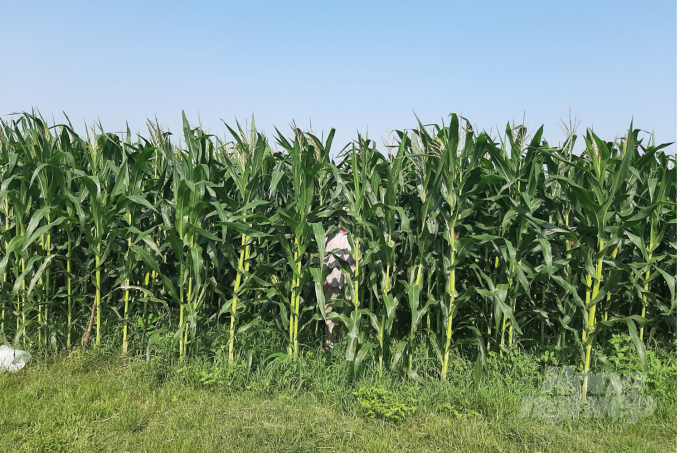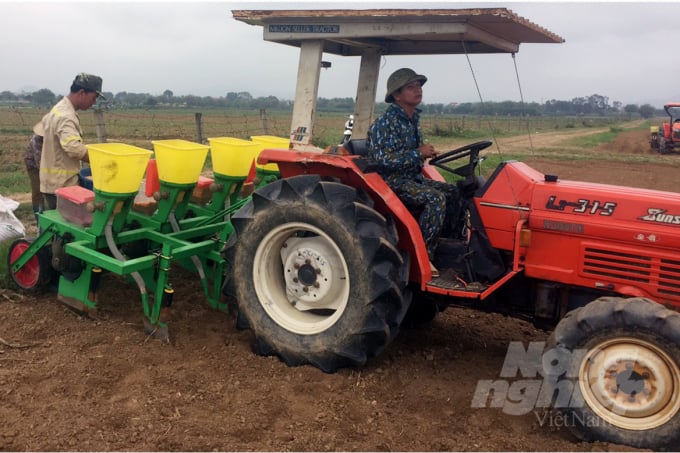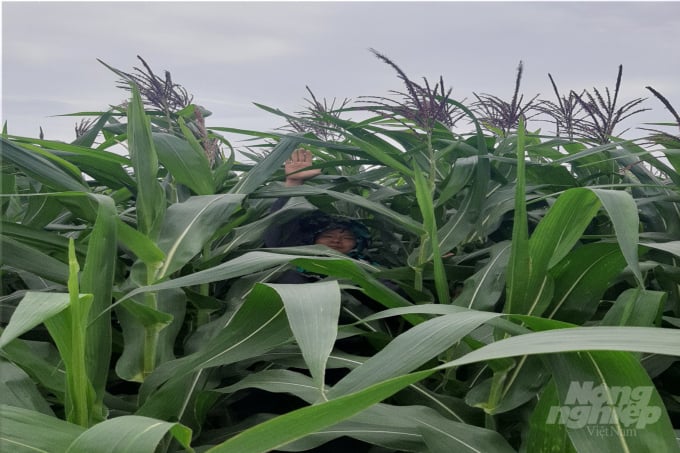November 28, 2025 | 01:48 GMT +7
November 28, 2025 | 01:48 GMT +7
Hotline: 0913.378.918
November 28, 2025 | 01:48 GMT +7
Hotline: 0913.378.918

Using bio-products to grow biomass corn helps plants grow well, reducing many disease objects. Photo: VD.
In the spring-summer crop of 2021, BiOWiSH Vietnam coordinates with farmers of Quyet Thang hamlet, Thieu Thinh commune, Thieu Hoa district (Thanh Hoa province) to plant a pilot model of 12 hectares of biomass maize.
The model used maize variety VN172 picked by the Institue. During the farming and caring, Thieu Thinh farmers used probiotics provided by BiOWiSH Vietnam.
Until now, after over 90 days of sowing, the maize plants have entered the milk-waxed phase, firm seeds, and ready to harvest. According to Thieu Thinh farmers, the yield is estimated at 2.7-2.8 tons/rod (500 m2). All products will be purchased by the representative of BiOWiSH Vietnam Biotechnology Joint Stock Company in Thanh Hoa to supply dairy companies.
Nguyen Quoc Hung, from Quyet Thang hamlet, said that before making soil, he used mineral-organic biological products supplied by BiOWiSH Vietnam Biotechnology Joint Stock Company to fertilize the soil.
After that, he used other biological fertilizers including NPK Bio, Ure Bio, Kali Bio, Lan Bio to fertilize and top up according to the instructions. These are chemical fertilizers containing biological products to help the plant grows fast and enhance the resistance against pests and diseases.

Mechanization in growing biomass corn helps to increase economic efficiency per unit area. Photo: VD.
“We grow 11 hectares of maize VN 172, so far it is ripe enough to be harvested, the yield is estimated at 54-56 tons per hectare, which is 8-10 tons per hectare, higher than the maize varieties I used to grow previously. This is a maize variety that features good resistance to pests and diseases and is very suitable for alluvial soils. If using probiotics to grow VN 172 maize, it creates a profit of VND 22-25 million per hectare per crop,” Hung said.
Hung added that, in addition to biological products and bio-fertilizers provided by BiOWiSH Vietnam Biotechnology Joint Stock Company, he did not apply manure, however, the yield was still higher than expected. The strong wind in recent days caused many maize fields to fall, but VN 172 still remains unharmed.

The yield of maize variety VN 172 using bio-products for growing biomass maize increased by 8-10 tons compared to other maize varieties. Photo: VD.
A representative of BiOWiSH Vietnam Biotechnology Joint Stock Company said that when implementing this model, the company wants to transfer the technique of growing biomass maize in a large field according to the US technology, mechanizing the whole process.
The results showed that the yield and quality when using probiotics and BiO fertilizers gave outstanding yield and quality. In the coming time, the company will expand its area and cooperate with farmers to provide biomass maize for dairy companies.
Maize VN 172 was selected and bred by the Maize Research Institute and has been recognized as a national variety. Each hectare of maize uses 22-26 kg of seed. VN 172 maize is suitable for growing biomass maize, the growing period of the spring-summer crop is 90 days, other crops are 110 days.
The process of fertilizing and using bio-products to grow biomass maize
A representative of BiOWiSH Vietnam Biotechnology Joint Stock Company said that before sowing seeds, farmers need to apply probiotics; fertilizing 801 Kg/ha NPK according to the rate of 5-10-3. When maize plants 3-4 leaves, farmers apply the first application of NPK (12-5-10) 453 kg/ha in combination with breaking down and dressing fertilizer for the second time with the same amount of when the maize plant has 9-10 leaves, combined with high cultivation, fall-resistance and applying 10 kg/ha URE.
/2025/11/27/3830-1-152901_403.jpg)
(VAN) Dong Nai is developing its key crop areas, expanding planting area codes, and applying high technology to increase the value of agricultural products, aiming at a green and sustainable agriculture.

(VAN) Tay Ninh’s livestock sector is undergoing a major transformation, applying high-tech, closed-loop circular models to build sustainable value chains.
/2025/11/26/3627-4-082628_818.jpg)
(VAN) From a small café on the red basalt highlands, Le Van Hoang started a business with clean coffee, building Enjoi Coffee into a symbol of organic agriculture in the Lam Dong plateau.
/2025/11/25/0045-1-135246_13.jpg)
(VAN) Ca Mau is researching a model of sea-encroaching embankments combined with viaducts and logistics service zones, aiming both to prevent erosion and create land funds for marine economic development.

(VAN) The information was shared at the seminar 'Urban Agriculture - Solutions for Developing Green Spaces,' organized by the Kinh te & Do thi Newspaper and the Biotechnology Center of Ho Chi Minh City.
/2025/11/19/4141-2-132831_216.jpg)
(VAN) One of Japfa's outstanding solutions is implementing digital transformation and artificial intelligence (AI) to optimize operations, enhance productivity, and advance sustainable development.
/2025/11/19/4847-1-093540_448.jpg)
(VAN) The Gia Lai Provincial People’s Committee had a working session with the delegation of the U.S. Department of Agriculture, the State of Idaho, and representatives of the State's leading enterprises.